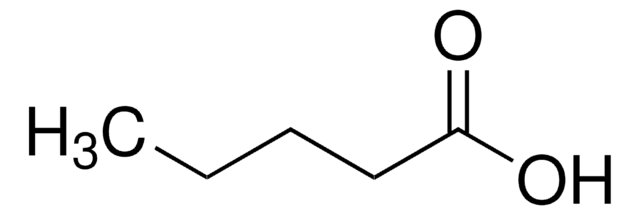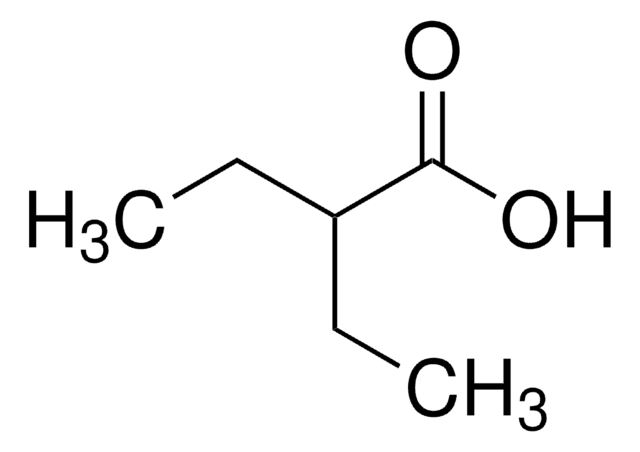About This Item
Recommended Products
grade
analytical standard
Quality Level
vapor density
3.04 (vs air)
vapor pressure
0.43 mmHg ( 20 °C)
Assay
≥99.5% (GC)
autoignition temp.
824 °F
shelf life
limited shelf life, expiry date on the label
expl. lim.
10 %
technique(s)
HPLC: suitable
gas chromatography (GC): suitable
refractive index
n20/D 1.398 (lit.)
bp
162 °C (lit.)
mp
−6-−3 °C (lit.)
density
0.964 g/mL at 25 °C (lit.)
application(s)
cleaning products
cosmetics
flavors and fragrances
food and beverages
personal care
format
neat
SMILES string
CCCC(O)=O
InChI
1S/C4H8O2/c1-2-3-4(5)6/h2-3H2,1H3,(H,5,6)
InChI key
FERIUCNNQQJTOY-UHFFFAOYSA-N
Looking for similar products? Visit Product Comparison Guide
Related Categories
General description
Application
- Development and validation of a high-performance liquid chromatographic (HPLC) method combined with UV detection to determine four short-chain fatty acids— formic acid, acetic acid, propionic acid, and butyric acid, and lactic acid in bacterial culture samples after their liquid-liquid extraction (LLE)
- Simultaneous analysis of 10 volatile and non-volatile organic acids in 18 samples of Korean traditional fermented soybean paste, doenjang, by HPLC combined with refractive index detector and gas chromatography coupled with flame ionization detector (GC-FID)
- Determination of butyric, lactic, acetic, and propionic acids in sour cassava starch waste-water samples by reversed-phase high-performance liquid chromatography (HPLC) and capillary electrophoresis (CE), both coupled with diode array detection (DAD)
- Multi-residue analysis of six short-chain fatty acids— acetic acid, propionic acid, butyric acid, isobutyric acid, valeric acid, and isovaleric acid, in biological samples of mice colon content by a gas chromatographic method combined with flame ionization detector (GC-FID)
- Packed-fiber solid phase extraction (PFSPE) of eight short-chain fatty acids using polypyrrole nanofibers, from urine samples of children for quantification by gas chromatography-mass spectrometry (GC-MS)
- Multi-residue analysis of 76 volatile compounds from jujube extract samples by gas chromatography-mass spectrometry (GC-MS) after their extraction by steam distillation combined with drop-by-drop extraction
Other Notes
Recommended products
Signal Word
Danger
Hazard Statements
Precautionary Statements
Hazard Classifications
Acute Tox. 4 Oral - Eye Dam. 1 - Skin Corr. 1B - STOT SE 3
Target Organs
Respiratory system
Storage Class Code
8A - Combustible corrosive hazardous materials
WGK
WGK 1
Flash Point(F)
161.6 °F - closed cup
Flash Point(C)
72 °C - closed cup
Personal Protective Equipment
Choose from one of the most recent versions:
Already Own This Product?
Find documentation for the products that you have recently purchased in the Document Library.
Customers Also Viewed
Our team of scientists has experience in all areas of research including Life Science, Material Science, Chemical Synthesis, Chromatography, Analytical and many others.
Contact Technical Service










